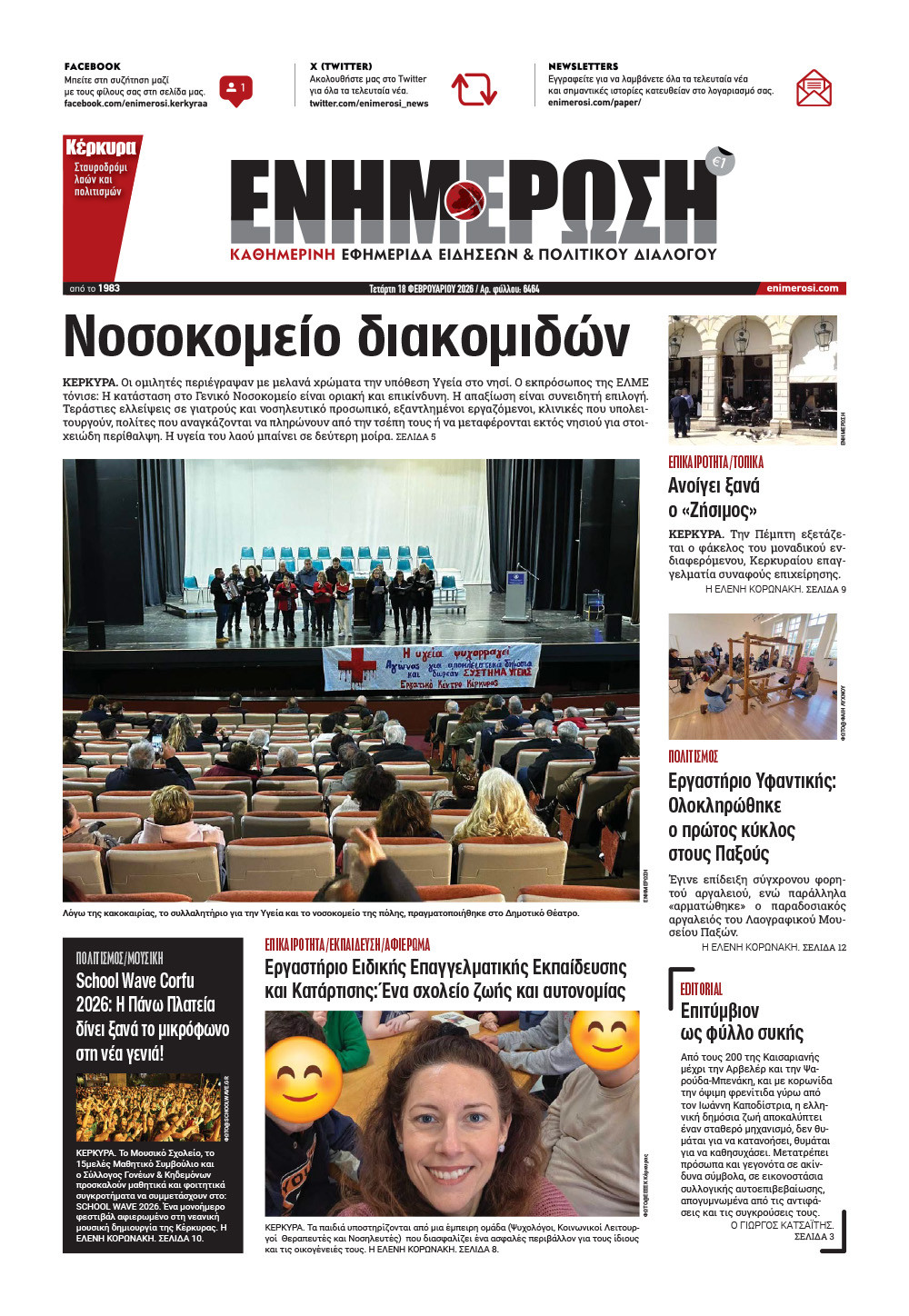Corfu Reading Society - Continuous presence in Corfu’s intellectual life for almost two centuries
 Photo: Reading Society’s Library
Photo: Reading Society’s Library
Corfu Reading Society
16 Jan 2023
/ 17:12
CORFU. Prominent personalities of Corfu have been its members, amongst which were Dionysios Solomos, Andreas Kalvos, Iakovos Polylas, Lorentzos Mavilis, Konstantinos Theotokis, etc.
The Society aims to research, study and promote issues related to the history, culture and intellectual and social life of Corfu and the Ionian Islands in general.

Reading Society's members
Prominent personalities of Corfu of the last two centuries have been its members, amongst which were Dionysios Solomos, Andreas Kalvos, Iakovos Polylas, Lorentzos Mavilis, Konstantinos Theotokis, etc.
Today it has approximately 500 members and 85 honorary members. It operates as a non-profit association. The Board is elected from the Society's founding members every two years.
The current Board consists of Thanasis Makris (President), Spyros Ziniatis (Vice President), Kostas Kardamis (Secretary), Martha Athinaiou-Takou (Treasurer), Dimitris Theotokis and Konstantinos Lindovois (Library Curators), Marilla Dados-Ventura and Katerina Kyriaki (Premises Curator). Its Executive-Scientific Director is Dimitris K. Zymaris.
1673810854.jpg)
Photo: The map room
The Society's establishment was influenced by other similar societies established in Europe in the 18th and 19th centuries, such as the Societé de Lecture de Genève.
The building and the collections
Since the beginning of the 20th century it has been housed in an emblematic two-storey 18th century building, located on the eastern part of Corfu Old Town.
It hosts numerous events, such as scientific conferences, lectures, speeches, book presentations, concerts, exhibitions and various educational programmes. On the ground floor of the building there is also a lounge area.
The Corfu Reading Society has a rich, specialised and constantly growing library of more than 35,000 volumes, including rare publications dating from the 16th to the 19th century.
It also has unique collections of various archival material such as manuscripts, newspapers, old photographs and rare maps, works of art etc.
In its archives one can find more than 30,000 newspaper issues (220 titles) of the 19th and 20th centuries, approximately 1,000 single-sheet prints dating from the late 18th to the early 20th century, as well as important archival collections from the 17th to the 20th century.
All this material is accessible for research in the Society’s reading room, which is open to the public.
Since 1969, it publishes the scientific journal Corfu Reading Society Bulletin, as well as other books pertaining to the Ionian Islands. It is also in touch with cultural institutions and universities in Greece and abroad.
1673811161.jpg)
Photo: The 2nd floor
The Corfu Reading Society (together with the Corfu 'Old' Philharmonic Society and the Society for Corfu Studies) is also the co-owner of the Capodistrias Museum. The Reading Society's President is member of the Capodistrias Museum Board, as well as a member of the Aggelos Yialinas Art Gallery Board.
The combination of the Society's various activities, the events it organises and the important archival material it collects and offers to the public for further study and promotion, make the Corfu Reading Society an intellectual beacon promoting all aspects of the Ionian Islands culture, along with the Greek and European culture in general.
Information taken from the Society’s website: www.corfureadingsociety.org

Reading Society's members
Prominent personalities of Corfu of the last two centuries have been its members, amongst which were Dionysios Solomos, Andreas Kalvos, Iakovos Polylas, Lorentzos Mavilis, Konstantinos Theotokis, etc.
Today it has approximately 500 members and 85 honorary members. It operates as a non-profit association. The Board is elected from the Society's founding members every two years.
The current Board consists of Thanasis Makris (President), Spyros Ziniatis (Vice President), Kostas Kardamis (Secretary), Martha Athinaiou-Takou (Treasurer), Dimitris Theotokis and Konstantinos Lindovois (Library Curators), Marilla Dados-Ventura and Katerina Kyriaki (Premises Curator). Its Executive-Scientific Director is Dimitris K. Zymaris.
1673810854.jpg)
Photo: The map room
The Society's establishment was influenced by other similar societies established in Europe in the 18th and 19th centuries, such as the Societé de Lecture de Genève.
The building and the collections
Since the beginning of the 20th century it has been housed in an emblematic two-storey 18th century building, located on the eastern part of Corfu Old Town.
It hosts numerous events, such as scientific conferences, lectures, speeches, book presentations, concerts, exhibitions and various educational programmes. On the ground floor of the building there is also a lounge area.
The Corfu Reading Society has a rich, specialised and constantly growing library of more than 35,000 volumes, including rare publications dating from the 16th to the 19th century.
It also has unique collections of various archival material such as manuscripts, newspapers, old photographs and rare maps, works of art etc.
In its archives one can find more than 30,000 newspaper issues (220 titles) of the 19th and 20th centuries, approximately 1,000 single-sheet prints dating from the late 18th to the early 20th century, as well as important archival collections from the 17th to the 20th century.
All this material is accessible for research in the Society’s reading room, which is open to the public.
Since 1969, it publishes the scientific journal Corfu Reading Society Bulletin, as well as other books pertaining to the Ionian Islands. It is also in touch with cultural institutions and universities in Greece and abroad.
1673811161.jpg)
Photo: The 2nd floor
The Corfu Reading Society (together with the Corfu 'Old' Philharmonic Society and the Society for Corfu Studies) is also the co-owner of the Capodistrias Museum. The Reading Society's President is member of the Capodistrias Museum Board, as well as a member of the Aggelos Yialinas Art Gallery Board.
The combination of the Society's various activities, the events it organises and the important archival material it collects and offers to the public for further study and promotion, make the Corfu Reading Society an intellectual beacon promoting all aspects of the Ionian Islands culture, along with the Greek and European culture in general.
Information taken from the Society’s website: www.corfureadingsociety.org





